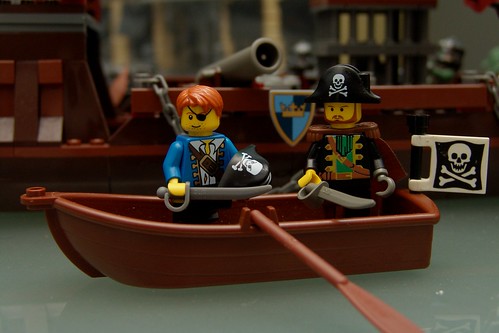by Michael Keizer on April 16, 2009
Things are getting slighty ridiculous.
I have posted twice now on piracy. That is honestly about as much attention as I would like to give them on this blog. Yes, they are a serious threat to aid logistics, and yes, they specialise in spectacular actions that are fine to generate breathless comment — but they are definitely not the most important issue in aid work, or even aid logistics.
Yet the last couple of weeks they have suddenly entered the consciousness of the public; suddenly everybody and their various aunts and uncles are scrambling to get on board and get their part of the booty. [Okay, enough pirate-related imagery, already. I will stop now.]
Just have a look at this graph from Google Trends:

Have a close look at the bottom part of the graph, which traces how often news articles refer to pirates, and note the sharp increase over the last month or so (the spikes in the top graph are related to losses of the baseball team). It now has come to the point where TV shows will follow pirates and the actions against them.
So what caused this spike? Only one thing: for the first time, pirates hijacked a ship under the US flag. Now what does that say about the media — and about us?

{
by Michael Keizer on March 5, 2009

If you are interested in logistics, health, and aid, the United States Naval Institute (USNI) blog is a wonder. Really.
The more-or-less recent attention in military circles for soft power means that the USNI is also more and more interested in how the Navy can be involved in aid, in order to win hearts and minds (force multipliers[1], anyone?). Of course, the US Navy is also one of the biggest logistics operations in the world (hey, logistics originally is a military science). So of course the USNI can be a source of fascinating stuff about the two.
One of those little gems was published a couple of weeks back. As the Navy is actively involved in catching those elusive Somalian pirates, some people are getting worried what an outbreak of e.g. MDR-TB, brought across by captured pirates, could do on a closely-packed military vessel. The stuff of nightmares, apparently, and they even quote MSF to support that. Luckily a commenter makes clear that TB is not that easy to transmit, but still…
My first posting ever on this blog was about the threat to aid (and hence to population health) posed by Somalian pirates. Apparently that threat goes further than that, and Navy sailors can be threatened by more than bullets.
(Picture: Arrrgh! | Pirates by Joriel “Joz” Jimenez. Some rights reserved.)
Footnote
[1] I find it curious that nobody noticed that Powell used the term ‘force multipliers’ routinely — he even had a personal rule: “[p]erpetual optimism is a force multiplier.” So his description of aid organisations as force multipliers might actually have been a lot less meaningful than it has been described. Still not a smart thing to say, though.
{
by Michael Keizer on February 6, 2009
Piracy has been a major problem for aid logistics around the Horn of Africa for some time now. Probably the most publicised case in recent years is the hijacking of the Faina, which carried a huge arms cache to an as yet unclear destination.
Although I am obviously very happy that the crew can now safely go home, I am also a bit worried what this will mean for future shipments. The message to the pirates seems to be that, how ever high the profile, you can get away with a high-sea hijack and expect to paid handsomely — and that will not do anything to prevent attacks on aid ships at all. To quote Noah Shachtman: “Score one — a big one — for the pirates of Somalia.”
Update (20 April 2009): It looks like my first-ever blog post signaled a big upswing in interest for pirates. For more information see my post on sense and nonsense of the current attention for piracy.
{


